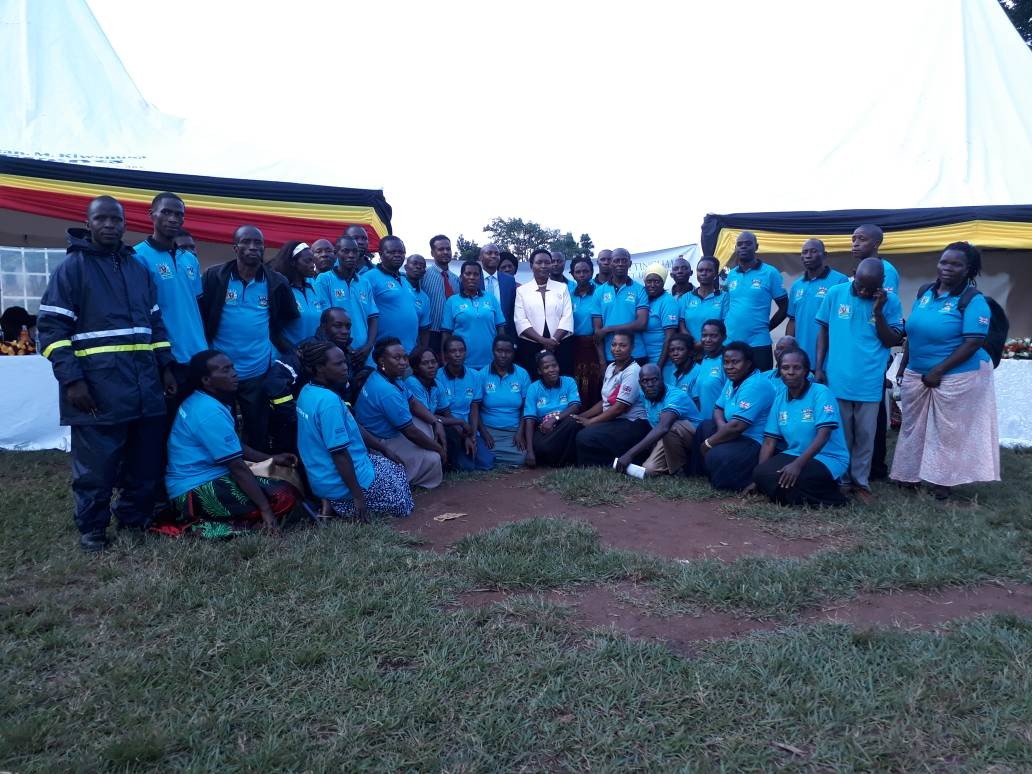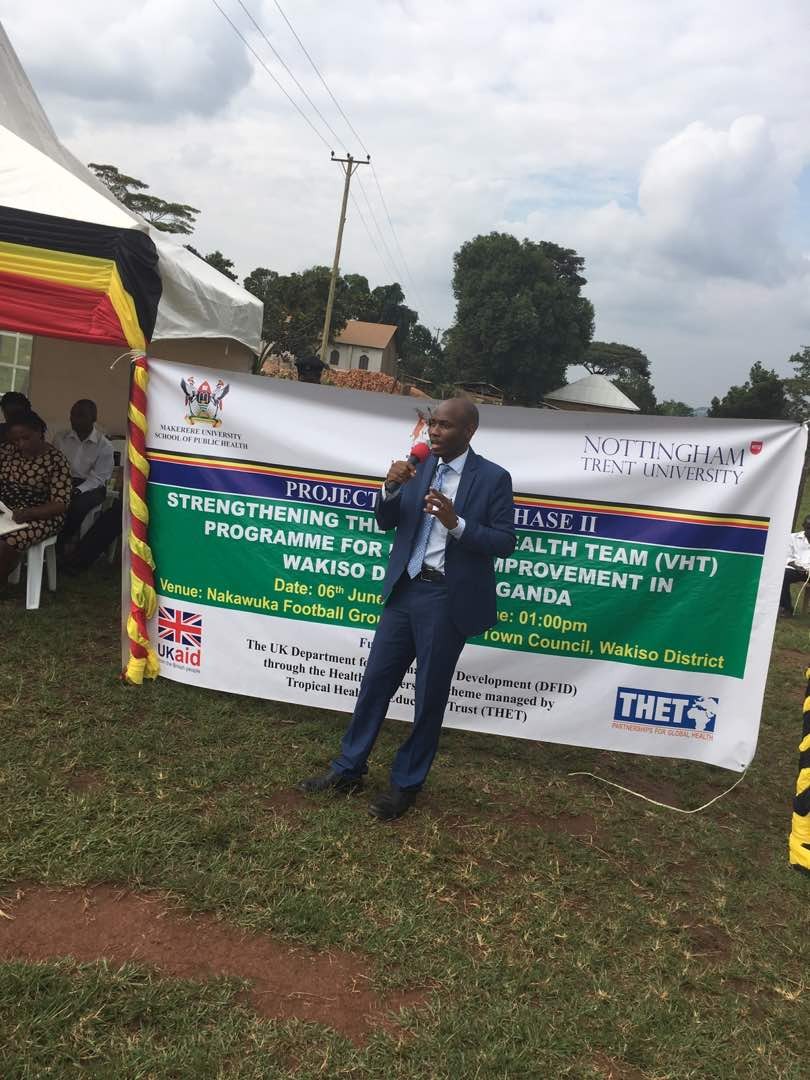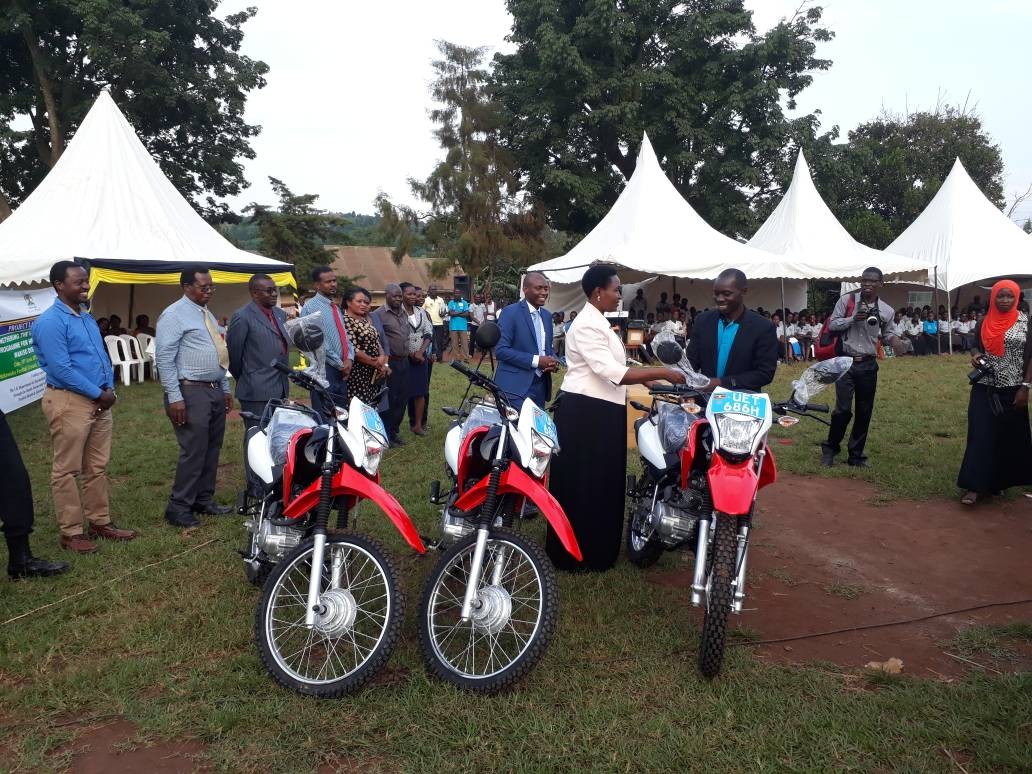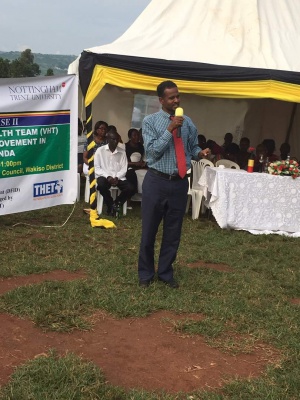
The crowd was calm and organised but exuberant all at the same time. The clapping was very loud whenever the need arose. The excitement was contagious. And the name on the lips of every speaker who rose up to address the audience was Dr David Musoke for his role in seeing to the success of the Community Health Workers (CHWs) project in Wakiso.
This event happened on June 6th, 2018 at Nakawuka Football Ground where Makerere University School of Public Health (MakSPH) in partnership with Nottingham Trent University (NTU) in the UK was launching the second phase of its project, Strengthening the Community Health Workers’ Programme for Health Improvement in Wakiso District. Gracing the function as Guest of Honour was Hon Rosemary Seninde, the Woman Member of Parliament for Wakiso District and State Minister for Primary Education in the Ugandan Cabinet.

Hon Sseninde commended Dr Musoke, the Principal Investigator (PI) for his outstanding lead role in the project. She also thanked MakSPH and its Dean for their tireless support to the community.
To the Community Health Workers (CHWs) who are locally more known as Village Health Teams (VHTs), Hon Seninde said: “It is important to note that the work you do as VHTs, I cannot do, and that is commendable. Service is very crucial regardless of our differences. Whether FDC or NRM, we should continue working together to lift our people to another level.” Seninde also thanked the UK Department for International Development (DFID) for their funding towards the project which has been channeled through Tropical Health and Education Trust (THET). She was also happy about the enormous work of the VHTs on the ground and that of the mayors and councilors, some of whom were present at the function.
Present at the event as well was Paul Ahura, the THET Country Manager who started by thanking Dr Musoke because he is ever responsive and helpful whenever he goes to him.
“I wish him the very best in this second phase of the project. I am happy that the project has procured nice quality items because this does not happen with many projects. Indeed, if you look at the t-shirts the VHTs are wearing, they are of good quality. Even the VHTs themselves look healthy and the motor bikes look strong and of great make.. I simply encourage the project team and all the VHTs to keep serving the nation because when you serve well and act as an example, the government will believe in this approach,” Ahura said.
About the history of THET and this project, Ahura said that the first phase of their funding ended in March, 2017. “But when we evaluated projects, this was one of those which had done well so we offered them an extension for one year that started in November, 2017,” he added.
The first phase of this project to strengthen VHTs started in Kajjansi Town Council, Wakiso district in 2014, according to Dr Musoke.“The project gave the VHTs various trainings to enable them do their work better. VHT work is voluntary and part of it involves visiting households for health improvement, community mobilizations for health interventions, and treatment of childhood illnesses among children under 5 years of age suffering from malaria, diarrhea and pneumonia. More recently, VHTs have been involved in distributing mosquito nets in their villages as part of the national mass campaign.” Dr Musoke explained.
The VHTs also received incentives such as t-shirts, umbrellas, gum boots and solar equipment to ease their work. Three motorcycles were provided in the first phase of work (and three others were provided in the second phase during the launch) to facilitate the transportation of VHTs during their supervision. With these motorcycles, VHTs are also able to transport nurses who previously had transport challenges going to the community for immunization outreaches. With training, enhanced supervision and incentives, the VHTs morale was boosted and hence their performance increased.
Since the project was rolled out, health workers in facilities in Kajjansi Town Council where this project was piloted are reporting reduced incidence of malaria, diarrhea and other diseases. Community members also observed better performance of the VHTs during the course of their work. It is with this success that THET and DFID committed to a further one-year of funding to the three new areas of Katabi Town Council, Kasanje Town Council and Bussi Sub county to add to Kajjansi Town council (which was formerly Ssisa sub county). The number of VHTs being supported by the project has therefore increased from 300 to over 500 to support the new areas in Wakiso district
Among the activities of the second phase of the project, VHTs have been trained and motivated with non-financial incentives in Kajjansi as part of visits of VHTs from the new areas. In addition, VHTwill be supported to increase their health promotion activities in the communities while focusing on women and people with disabilities.
Dr Tabley Bakyaita , the Assistant Health Commissioner Health Promotion and Education Division at the Ministry of Health said that,
"Community health extension workers (CHEWs) are being introduced but VHTs are here to stay for the good of society. Do work with love, if you continue doing it with passion, what you do will promote you,” he implored the VHTs. He added that the Ministry of Health remains committed in supporting the work of VHTs including distribution of drugs. He also urged the VHTs to focus on sanitation and hygiene asa matter of urgency as it greatly contributed to good health. In the course of their work, he also urged VHTs to refer patients to health centres if they see the situation of a person worsening and not to hold onto them.
In his speech, Matia Lwanga Bwanika, the LC V Chairman of Wakiso district expressed hope and gratitude in his words tothe project. The Chairman also proposed that all stakeholders in health should work together to purchase an ambulance for the district and also an acre of land to build a model health facility in Wakiso district.
Speaking on the behalf of the Dean of MakSPH, Abdullah Ali Halage, a Lecturer in the Department of Disease Control and Environmental Health thanked the Ministry of Health, DFID, THET, Dr Musoke and project team, and all stakeholders for the willingness to work with MakSPH to promote healthcare. He particularly highlighted the good performance of the VHTs in the first phase of the project that lead to getting additional funding for the second phase.
“As MakSPH, our brand remains a valued global figure. We shall continue to do teaching, research and community service for the good of communities in Uganda." Halage said.
When called upon to speak, the Wakiso District Health Educator, Bonny Natukunda thanked MakSPH and the Ministry of Health for their support. She said this project had revolutionalised the way VHTs do their work in the district and indeed entire country
“We have had a lot of projects but there has been none like this one. When this project began, we were able to train and learn how to treat sicknesses. We also thank the project together with the Ministry of Health for providing us with drugs which have enabled us to lower sickness rate among children for diseases like pneumonia. We request that the project be scaled to all areas of our district," she said.



